Obama criticized for Diaoyu Islands remarks
Updated: 2014-04-24 06:58
By Zhang Yunbi (China Daily USA)
|
||||||||
|
 Anti-riot policemen use their shields to push back protesters making their way to the US embassy during a protest against the upcoming visit of US President Barack Obama next week, in Manila on Wednesday. Romeo Ranoco / Reuters |
Beijing is adamantly opposed to the Diaoyu Islands being placed under the US-Japan defense treaty, a Foreign Ministry spokesman said on Wednesday.
His comments came after US President Barack Obama, in a rare public statement ahead of his visit to Tokyo, committed US forces to back Japan in the event of a conflict over China's Diaoyu Islands.
In a written interview published on Wednesday by Japan's leading newspaper Yomiuri Shimbun, Obama said the islands "fall within the scope of Article 5 of the US-Japan Treaty of Mutual Cooperation and Security".
"And we oppose any unilateral attempts to undermine Japan's administration of these islands," Obama said.
Spokesman Qin Gang said the Foreign Ministry "firmly opposes" actions that place the Diaoyu Islands under the cover of the US-Japan treaty and urged Washington to "speak and act cautiously".
"The US-Japan alliance is a bilateral arrangement formulated during the Cold War era, which should not infringe on China's territorial sovereignty and lawful rights and interests," Qin said.
Qin added that China's determination and will to safeguard territorial integrity, sovereignty and maritime interests is unshakable.
The US president made the comments just before he started his visit to Japan on Wednesday night, the first stop of his four-nation East Asia tour.
Washington should respect the facts, take a responsible attitude and "sincerely honor its commitment of not taking sides in regard to territorial issues", Qin said.
Yomiuri said this was the first time that an incumbent US president publicly stated the US defense umbrella covers the islands.
Previously, US secretaries of state or defense made similar remarks on different occasions, yet they also added that the US does not take a position on the ultimate sovereignty of the islands.
Shi Yinhong, a professor of international relations at Renmin University of China, warned that Obama's comments will "have a considerable impact" and increase China's suspicions over US engagement in the region.
Such comments will also "prompt the Japanese Cabinet to make more misjudgments over the overall strategic picture in the Asia-Pacific region", Shi said.
Zhou Yongsheng, a professor of Japan studies at China Foreign Affairs University, said Washington "has followed a dual-track policy".
The US is actually "an initiator of the islands dispute", he said, after Washington allowed Japan to administer the islands decades after WWII.
Japan seized the islands during the 1894-95 Sino-Japanese war.
However, the US unilaterally included the islands under its trusteeship in the 1950s and "returned" the "power of administration" to Japan in the 1970s, an illegal move Beijing has called a "backroom deal".
"The islands were deliberately left by the US as an unresolved headache between China and Japan, and tensions between them serve the interests (of Washington)," Zhou said.
Shi Yinhong said Obama's remarks may be "a turning point" in the diplomatic crisis between China and Japan that started in September 2012 when the Japanese government unilaterally announced it would "nationalize" the islands.
Obama's words will deepen the mistrust between China and the US, he said.
Chinese experts believed supportive voices from Washington resonate with Japan's plans to boost its military buildup by exaggerating the situation in the East China Sea.
Lyu Yaodong, an expert on Japan's diplomatic policies at the Chinese Academy of Social Sciences, said that Japan is playing a public relations game.
"Japan has long been dissatisfied with China's regular measures that strengthen its lawful maritime rights and interests, and it is projecting an unfavorable image of China," Lyu said.
Meanwhile, Obama for the first time hailed Japanese Prime Minister Shinzo Abe for his efforts to "strengthen Japan's defense forces and to deepen the coordination between our militaries, including by reviewing existing limits on the exercise of collective self-defense".
Japan has seen heated debate in the past week over plans to relax the ban on what it terms collective self-defense, the ability to wage war or enter conflict for another country, and some worried that the pacifist Constitution was being fatally undermined.
"We believe that it's in the interest of both our countries for the Japanese Self Defense Forces to do more within the framework of our alliance," Obama told Yomiuri.
Tokyo is likely to initiate discussions in May to allow the Constitution to endorse collective self-defense.
The Wall Street Journal Asia Edition warned on Wednesday that Abe "is pushing to remove six-decade-old constraints on his country's military", a goal "that could also unsettle the region".
Li Xiushi, a researcher of Japanese studies at Shanghai Institutes for International Studies, said Japan is both "a good helping hand and also a troublemaker" for the US as it pivots toward Asia.
"And Japan is a 'hitchhiker' who tries to take advantage of the US rebalancing strategy to accomplish its own strategic expansion and enlarge its military presence," Li warned.
zhangyunbi@chinadaily.com.cn
(China Daily USA 04/24/2014 page3)
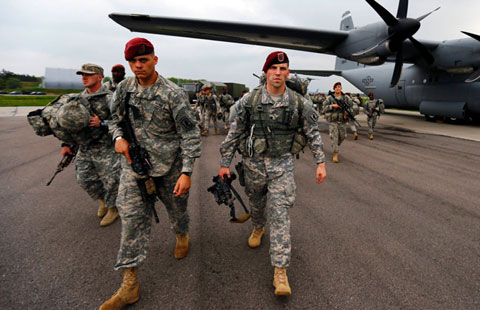
 US sends troops to Poland for exercises
US sends troops to Poland for exercises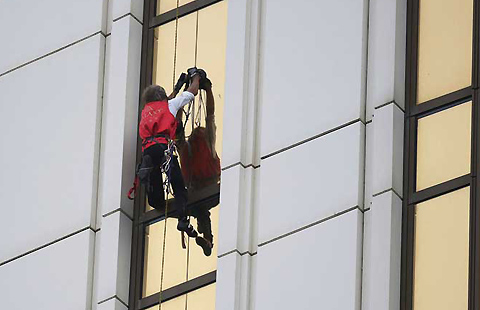
 French 'spiderman' scales 33-story building in Macao
French 'spiderman' scales 33-story building in Macao
 2014 China Graduate Fashion Week in Beijing
2014 China Graduate Fashion Week in Beijing
 Top 10 celebrities driving auto brands
Top 10 celebrities driving auto brands
 Childhood photos of Prince William and Kate
Childhood photos of Prince William and Kate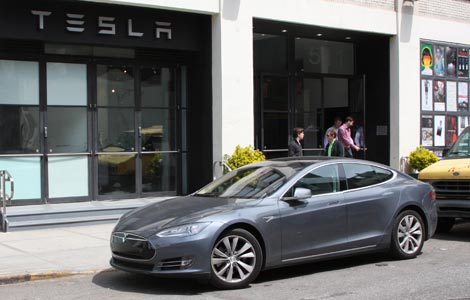
 First Tesla luxury sedans arrive in China
First Tesla luxury sedans arrive in China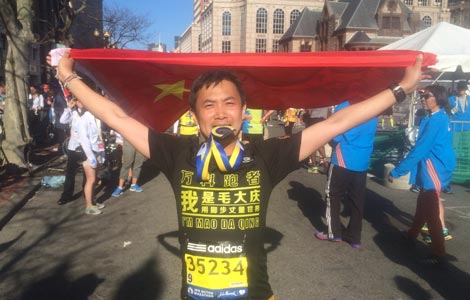
 In this year's Boston Marathon, everyone's a winner
In this year's Boston Marathon, everyone's a winner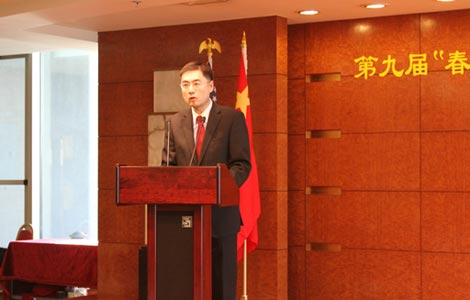
 Innovation competition kicks off in New York
Innovation competition kicks off in New York
Most Viewed
Editor's Picks

|

|

|

|

|

|
Today's Top News
Obama criticized for Diaoyu Islands remarks
Opinion: Asia's future at risk
Jackson doctor denied latest appeal
Another US warship enters Black Sea
Slower growth poses challenges: AmCham
New investment rules open doors
Tesla luxury sedans arrive in China
Lenovo plans sales of 100m smartphones
US Weekly

|

|







